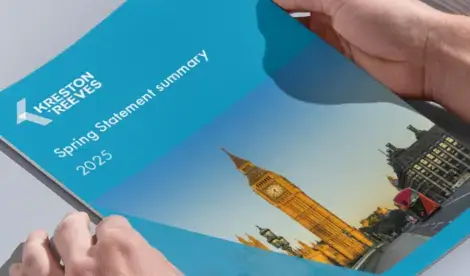1 January 2023 VAT Penalty System Changes
With effect from 1 January 2023, HMRC are replacing the existing default surcharge regime for penalising late VAT return submissions and payments by VAT registered businesses to a new penalty regime which is designed to be more consistent with other direct taxes and should provide for a fairer system. It should be noted that accounting periods which straddle 1 January 2023 will be subject to the current default surcharge regime, therefore the new regime will affect periods starting on or after 1 January 2023.
The new rules were originally set to take effect from 1 April 2022 but were delayed to allow HMRC more time to update its IT systems.
Under the outgoing default surcharge regime, either late submission or late payment of a VAT return incurred a default surcharge at increasing percentages of 2%, 5%, 10% and 15% (max) of the net tax due for each return in default. No interest was chargeable by HMRC on late VAT payments. These percentages were applied in full even if a VAT return was submitted/ paid just a day late (or part paid), which led to some clients receiving unexpectedly large and seemingly disproportionate fines. This new regime seeks to rectify this.
Instead of a surcharge for either late payment and/ or late submission, penalties will be chargeable separately for either late submission or late payment as follows:
Penalties for late VAT return submissions
A fixed £200 penalty will be due for each late submission but only after a point penalty threshold has been reached. The level of points threshold depends on the taxpayer’s submission frequency:
Annually – 2 points
Quarterly – 4 points
Monthly – 5 points
Each time a submission/ payment deadline is missed a point will be awarded. Penalty points will expire after 24 months where the threshold has not been exceeded. After the points threshold has been reached, all points will expire after the taxpayer has met their return obligations for a set period of time based on their submission frequency (annually = 24 months, quarterly = 12 months, monthly = 6 months).
As an example, if a taxpayer on quarterly VAT returns submits 4 VAT returns in a row late, it will have received 4 points and therefore incur a penalty of £200.
Subsequent late submissions will continue to incur £200 penalties until cleared.
Unlike the outgoing default surcharge regime, this new late submission penalty could affect those in a VAT repayment position. At present there is no penalty for not submitting a repayment return.
Penalties for late payment of VAT (split into a first and second charge)
No penalty will be payable if the amount outstanding is paid within 15 days of the due date.
First Charge
Unless a time to pay arrangement has been agreed, a penalty will be due if payment is not made within 15 days of the payment due date, calculated as follows:
Payment made between day 16 to day 30 2% penalty on outstanding amount at day 15
No payment made at day 30 4% penalty on outstanding amount at day 15
This penalty is payable at day 30.
As examples:
If a taxpayer pays a VAT return showing net VAT due of £20,000 on day 20 (i.e. between 16 and 30 days), it will incur a penalty of 2% – £400.
If the taxpayer pays a VAT return showing net VAT due of £20,000 on day 40 (i.e. more than 30 days), it will incur a penalty of 4% – £800.
HMRC has announced a period of familiarisation for taxpayers until 31 December 2023, whereby there will be no first charge if payment is made in full within 30 days of the payment due date.
Second Charge
Unless a time to pay arrangement has been agreed, an additional daily penalty (of 4% per annum) will be calculated from day 31 after the due date until full payment has been received by HMRC.
As an example:
If the taxpayer pays a VAT return showing net VAT due of £20,000 on day 40, it will incur a daily penalty for 10 days – at 4% per annum this second charge would be £21.92.
This would make the total late payment penalty £821.92 at day 40 (not including the £200 points based penalty, if applicable).
In all cases, if a time to pay agreement is proposed and accepted by HMRC the penalty charges will cease at that point.
Interest on payment of VAT liabilities
Under the default surcharge regime no interest was payable on late payments.
Under the new penalty regime, interest will now be due on any outstanding VAT from the due date until full payment has been received by HMRC. This will be calculated at the Bank of England base rate plus 2.5%. This is in addition to any penalties that may be due.
As an example:
If the taxpayer pays a VAT return showing net VAT due of £20,000 on day 40, it will incur an interest charge for the 40 days – at 3.5% (i.e. the current Bank of England base rate at the time of writing) plus 2.5% (per annum) this would be £131.50.
Total late payment penalties
Using the examples above, a taxpayer paying the VAT due after 40 days would incur a penalty as follows:
First charge – 4% = £800
Second charge – 4% x 10/365 = £21.92
Interest – 6% x 40/365 = £131.50
This makes the total penalty for late payment £953.42.
This does not include the £200 points based penalty for late submission, if applicable.
This is a significant change to the penalisation of late return submission/ payment and should, in theory, be more equitable but may be complicated to understand in the first instance.
What is not clear at this stage is what happens to existing defaulters in the period from 1 January 2023 – it would be a welcome change if the slate was effectively wiped clean at that point.
Please talk to a member of the VAT team if you have any questions or clients that might be affected.
Share this article
Email Daniel
This site is protected by reCAPTCHA and the Google Privacy Policy and Terms of Service apply.
Related people
Rupert Moyle BA (Hons)
- Partner and Head of VAT and Duty
- +44 (0)330 124 1399
- Email Rupert
Email Rupert
This site is protected by reCAPTCHA and the Google Privacy Policy and Terms of Service apply.
Related news and insights
Subscribe to our newsletters
Our complimentary newsletters and event invitations are designed to provide you with regular updates, insight and guidance.
You can unsubscribe from our email communications at any time by emailing [email protected] or by clicking the 'unsubscribe' link found on all our email newsletters and event invitations.
This site is protected by reCAPTCHA and the Google Privacy Policy and Terms of Service apply.















